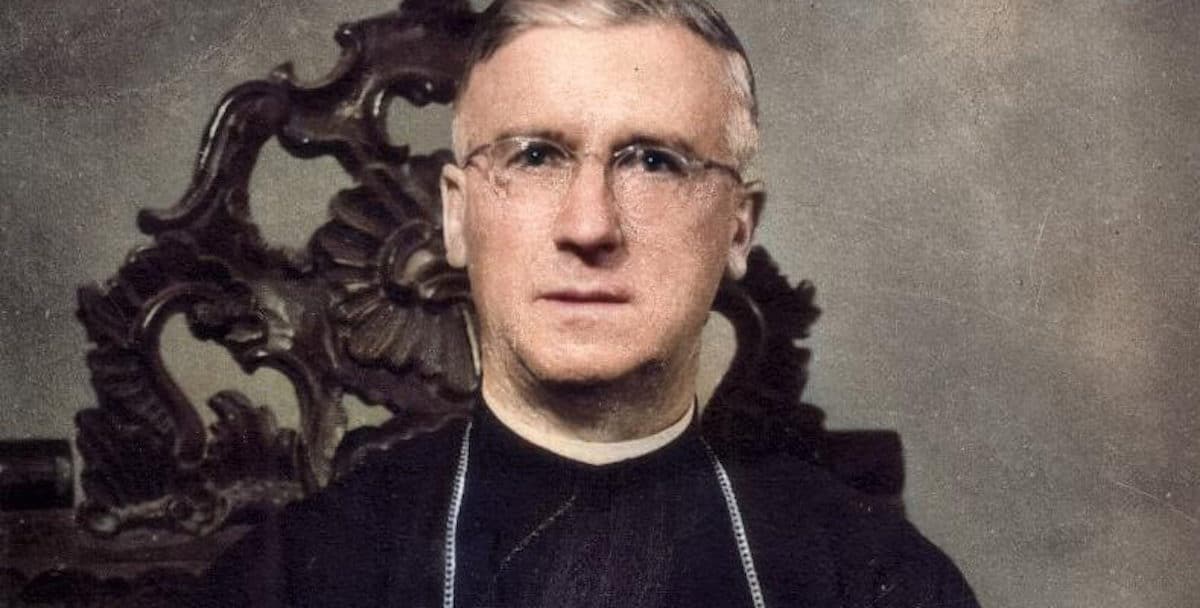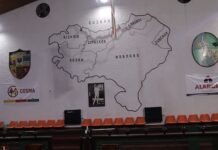The Limako Arantzazu Euzko Etxea—Lima Basque Center has just made the announcement on their blog: Monsignor Martín Fulgencio Elorza Legaristi, shall name Monsignor Elorza, Basque, Passionist, missionary in the Peruvian Amazon, and Bishop of the Catholic Church, as part of his beatification process, as Venerable.
Just like the Basque Center and the Brotherhood of Our Lady of Aranzazu of Lima, we’re filled with joy and pride that the the work of over a century of the Basque Passionists is going to be recognized by the Catholic Church in the person of Monsignor Elorza.
We’re also proud to have dedicated the space we have to these Basques’ work in the Amazon. We’ve even heard that our articles were used during this process, both the ones we’ve dedicated to the work of the Passionists and the articles we wrote specifically about Monsignor Elorza on the 120th anniversary of his birth, which included two books (which can be downloaded in .pdf format) which not only speak of the life of this Basque from Elgeta, but also give an amazing overview of the commitment and the contributions of the Basque Passionists to democratic Basque society during the dark years of the Spanish Civil War and the dictatorship that followed.
We also believe that this recognition of a Basque missionary is a general recognition of the work of so many Basques over the century. As we’ve commented before, they make up a fundamental part of the Basque Diaspora, which which they share many things, but with one important difference: while in most cases, those who left the Basque Country did so in search of a better life, most Basque missionaries left to build a better world for others.
And in this work, the Basque Passionists in the Amazon jungle of Peru are a role model for us all.
We’ll leave you, with the permission of the Basque Center, the article that was published on the Limako Arantzazu Euzko Etxea blog, where you can read all about this good news.
Lima Basque Center – 15/3/2022 – Peru
Monsignor Elorza, the first Bishop of Moyobamba and a Basque Passionist, to be named Venerable by the Church
Today is a day in which we feel especially joyful and proud. It is a day in which the work of the Passionists in the jungles of Peru shall receive a glorious blessing. It is a day when the work of the Basque Passionists in this corner of the world is to be recognized by way of one of its most distinguished representatives.
Today, one of our chaplains, Father Antonio María Artola Arbiza C.P, has informed us from Bilbao that Monsignor Martín Fulgencio Elorza Legaristi, or Monseñor Elorza, Basque, Passionist, missionary in the Peruvian Amazon, and Bishop of the Catholic Church, as part of his beatification process, is to be named Venerable.

For us as Basques in Peru, as Catholics, as admirers of the work of the Passionists in Peru, and as administrators of more than 400 years of history and social work at the Brotherhood of Aránzazu in Lima, this news has filled us with joy.
When, in 2013, the Brotherhood of Our Lady of Aránzazu of Lima promoted the international events to mark the 100th anniversary of the arrival of the first twelve Passionists to the Peruvian Amazon, it did so for two main reasons.
- Firstly, to highlight the value of the enormous, and extraordinary, work that has been, and still is, carried out over the past century, by the Passionist Community with the inhabitants of that part of Peru.
- Secondly, to remember and pay homage to the core group of brothers who were the backbone of that religious community in those first hundred years, transforming the lives of the inhabitants of the Vicariate of Yurimaguas and the Prelature of Moyobamba. We’re referring to the Basque Passionists who brought with them the best community values to that part of the world.
We’re not sure if a sapling of the Tree of Gernika, the oak tree that represents the Basques’ love of freedom, equality, and justice, would be able to take root in the middle of the jungle. But what we are sure of is that the Basque Passionists, every since those first twelve missionaries arrived in Peru in 1913, have sown those values in that jungle with their works. They’ve sown and nurtured it with their commitment, their hard work, and even their lives, to ensure that they would grow strong and thrive in the lands where they planted them.
These young Basques, we’re sure, arrived with a clear idea that their mission was to “convert the savages,” and to “save souls.” But they soon realized that their true mission was to collaborate in the creation of a more just society, where the most humble people living in that jungle could receive medical care, an education, civil rights, housing, and in general that they should be recognized and respected as citizens. And of course, they did all this without forgetting their pastoral work. What’s more, we’re sure that they were aware that all their hard social work was a key part of that missionary work.

They understood this, and put it into practice, as soon as they arrived, with the strong support and backing that was given them fifty years later by the Second Vatican Council, where they actively took part.
They were Basques. They were Basques born to farmers, fishermen, laborers, etc. They came from a society where “community values” are essential. They were not ones to “give a man a fish” or simply give handouts. They were those who “taught a man to fish” because they felt close to, as a part of the family, of those who lived in that place where the Pope had sent them to carry out their work.
Many of them indeed had to first learn in order to then be able to teach. They had to learn how to make roof tiles and bricks, to lay roads, build ships and buildings, construct workshops and schools. They set up medical centers, hospitals, presses, radio and TV. All their energy, which was bountiful given the results, was dedicated to a fundamental mission: to improve the lives of those peoples, providing them with resources and autonomy as individuals and as a community.
Moreover, they did not go there with the intent of making themselves necessary. Their mission, their will, was not to become leaders, but rather collaborators. One of their main goals was to train people to help in creating a society that could take care of itself. That’s why today, as the Basque Passionist community grows smaller in the Peruvian Amazon, the future and continuity of their work is guaranteed. It is the inhabitants of those lands themselves who are taking the wheel of the work that began in 1913.
Spreading the work of the Basque missionaries in Peru and in the world
As a brotherhood of Basques in Peru, we have paid close attention to the Basque Passionists in our country ever since their arrival. We also supported their work, organized their centenary, and in collaboration with the Euskadi Munduan Association, and its blog aboutbasquecountry.eus, we’ve spread the word of their work, their history, and their achievements, thereby joining in on the support they have always received from Basque institutions.
We’ve always stood up for the Basque Passionists because of how close and well-known they are to us, but we know that their commitment and dedication has been shared by thousands of Basques who, as missionaries, have spread the best of the “Basque spirit” to every corner of the world, thereby becoming an integral part of the Basque Diaspora.
This is work to recognize their amazing, and often invisible, work that we are proud to have carried out in order to make theirs more visible. We feel co-responsible for ensuring that these Basques have gained greater visibility in each successive Day of the Basque Diaspora.
Monsignor Elorza
In 2019, we remembered the 120th anniversary of the birth of Monsignor Elorza, bringing you two books about his life and works.
The first of them, Monseñor Martín Elorza, pasionista, was written by fellow Passionist Father Antonio María Artola, and offers us a complete biography of Elorza’s life, from his birth in Elgeta to his death in Peru. This document was typewritten and given by the Passionists to Julio Pablo Bazan in order to be included in the archives of the Brotherhood of Our Lady of Aranzazu in Lima – Limako Arantzazu Euzko Etxea (Lima Basque Center). Here we include a photocopy of the original.
The second, which is closely related to the news we’re sharing today, is the work that historian Oscar Álvarez-Gila prepared at the behest of the Passionists and which was presented to the Archbishop of Lima on December 8, 1996 as the historical part of the documentation of the life of Mons. Elorza in his episcopal work in Moyobamba which was used as the Introduction to the Cause for his canonization. In order to include this biography, which was sent to Rome, we’ve had to convert the documents which had been saved in a twenty-year-old version of Word to a current version, and re-edit the general design.
In both cases, the work to prepare and print was carried out by the Euskaid Munduan Association, which shared them on its blog, aboutbasquecountry.eus.
Apart from the biographical work of Monsignor Elorza’s life, we can also highlight the value of the historical descriptions in the book written by Artola, especially the chapters dedicated to the so-called Spanish Civil War and the first years of the Franco dictatorship.

We’re told, from the point of view of a Passionist priest, of the situation they lived through and the role played by the authorities and political and social groups during those years. We are also clearly shown the commitment of this order to its homeland (and ours), the Basque Country.
The book dedicates an entire chapter to “Aita Patxi,” the Passionist who was a student of Elorza’s and a chaplain to the gudaris, whose heroism and dedication ought to mark him indelibly in the memory of the Basques and receive the recognition of the Church. He was on the worst front during that war against the monster of totalitarianism that almost devoured Europe. He was also at the Bombing of Guernica, and retells it in full, precise detail. He highlighted the presence of a large number of passers-through, including several battalions of the Basque Army, and spoke of the thousands of victims when discussing the consequences of that attack.
Here are the books about Monseñor Elorza
Venerable of the Church
This canonization process that began with the book by historian Oscar Alvarez-Gila has continued along from 1996 until now, and it has finally given its first fruit: the Catholic Church’s decision to name him Venerable.

And it, along with the push provided by the arrival of Pope Francis, has contributed to furthering our permanent memory of the man and work of Monsignor Elorza, because this work to stand up for his memory and to share his work has traveled all the way to Rome to be added to his cause for beatification, something we are quite proud of.
As we stated in our blog entry at aboutbasquecountry,eus on the 120th anniversary of his birth:
Martín Fulgencio Elorza Legaristi shines for so many reasons: his commitment and dedication, his work ethic and organization, his iron will to carry out his mission and fulfill the responsibilities he had been given.
He was a man with a conservative religious point of view who had to live through times of great changes, both in his homeland, Euskadi, as well as his adopted home of Peru. He also had to live through times of great reflection and change in the Catholic Church. He lived the Second Vatican Council as a participant, with everything that brought with it as regards changes and indeed revolution in the Church. He didn’t feel prepared for the great theological debates, but he proposed and defended radical changes in the way the Church dealt with the faithful, he defended the use of vernacular languages in the Church.
He was a Basque who lived through the persecution of his language, and he was a missionary in the Amazon; there fore, he knew how important it was to talk to people in their own language.
Today is a day of joy for our Brotherhood. The work of one man, a Basque, a Passionist, a missionary, a good man, is finally being recognized. We feel that we as Basques, as members of the Brotherhood, and as participants, have played a part, as far as we could, in ensuring that the Church gives him that recognition.
As we said before, this recognition is not just for him, but for the work of thousands and thousands of Basques who went out into the world not seeking a better life for themselves, but rather hoping to build a brighter future for others.
To all of them, we give our thanks and acknowledgement on this very special day.
Last Updated on Sep 29, 2024 by About Basque Country





